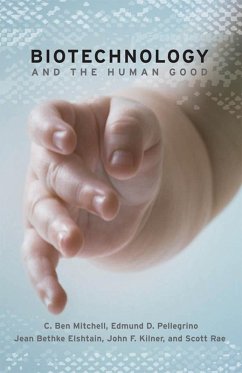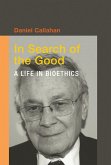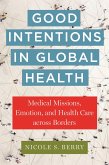Some of humankind's greatest tools have been forged in the research laboratory. Who could argue that medical advances like antibiotics, blood transfusions, and pacemakers have not improved the quality of people's lives? But with each new technological breakthrough there comes an array of consequences, at once predicted and unpredictable, beneficial and hazardous.
Outcry over recent developments in the reproductive and genetic sciences has revealed deep fissures in society's perception of biotechnical progress. Many are concerned that reckless technological development, driven by consumerist impulses and greedy entrepreneurialism, has the potential to radically shift the human condition-and not for the greater good. Biotechnology and the Human Good builds a case for a stewardship deeply rooted in Judeo-Christian theism to responsibly interpret and assess new technologies in a way that answers this concern.
The authors jointly recognize humans not as autonomous beings but as ones accountable to each other, to the world they live in, and to God. They argue that to question and critique how fields like cybernetics, nanotechnology, and genetics might affect our future is not anti-science, anti-industry, or anti-progress, but rather a way to promote human flourishing, common sense, and good stewardship.
A synthetic work drawing on the thought of a physician, ethicists, and a theologian, Biotechnology and the Human Good reminds us that although technology is a powerful and often awe-inspiring tool, it is what lies in the heart and soul of who wields this tool that truly makes the difference in our world.
Outcry over recent developments in the reproductive and genetic sciences has revealed deep fissures in society's perception of biotechnical progress. Many are concerned that reckless technological development, driven by consumerist impulses and greedy entrepreneurialism, has the potential to radically shift the human condition-and not for the greater good. Biotechnology and the Human Good builds a case for a stewardship deeply rooted in Judeo-Christian theism to responsibly interpret and assess new technologies in a way that answers this concern.
The authors jointly recognize humans not as autonomous beings but as ones accountable to each other, to the world they live in, and to God. They argue that to question and critique how fields like cybernetics, nanotechnology, and genetics might affect our future is not anti-science, anti-industry, or anti-progress, but rather a way to promote human flourishing, common sense, and good stewardship.
A synthetic work drawing on the thought of a physician, ethicists, and a theologian, Biotechnology and the Human Good reminds us that although technology is a powerful and often awe-inspiring tool, it is what lies in the heart and soul of who wields this tool that truly makes the difference in our world.
Dieser Download kann aus rechtlichen Gründen nur mit Rechnungsadresse in A, D ausgeliefert werden.









